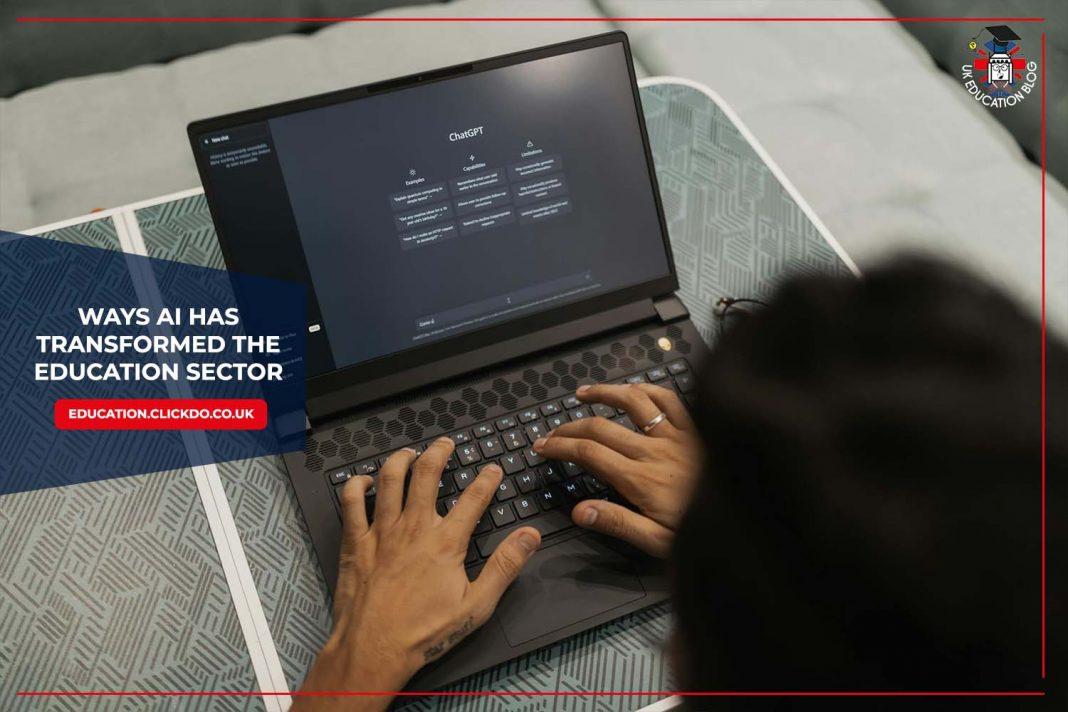Over the past few years, artificial intelligence and LLMs (large language models) have rapidly expanded across multiple sectors, including education.
While some have been hesitant to adopt AI as a technology – and there’s no denying there are some drawbacks and issues to be cautious about when it comes to AI – some educators are finding it a godsend, opening new possibilities for both teachers and students.
Here are a few ways in which AI is changing the education sector.
1. Admissions and Enrolment
One thing that AI excels at is sorting and routing information. AI algorithms can quickly analyse and compare applicant data, making the selection process for admissions and enrolment considerably faster. Test scores, academic records, and extracurriculars can be evaluated much more quickly than by human agents.
2. Academic Advising

AI can also assist with offering custom-tailored career advice and course recommendations for students. Human advisors are far from obsolete, but human advisors may not have complete access to a student’s records and data in the same way an AI does. AI can sort and analyse a vast amount of information and offer personalised career goals or academic advice for students, as well as analyse job market trends to suggest the most lucrative field of study possible.
3. Curriculum Planning
Some educators dread the pressure and workload of designing their curriculum for the upcoming year. AI can help with this too, by evaluating performance data and student feedback to suggest which topics should be prioritised, and optimising course selections for maximum student engagement. An AI model could also predict challenges certain students might face and allow educators to make adjustments for those who may have different or special needs.
4. Learning Management Systems
Learning Management Systems (LMS) have undergone a major evolution with the integration of AI, offering a more personalised and interactive learning experience. As mentioned previously, AI can assist with sorting and automating tasks such as tracking student progress, enrolment, and more, freeing up time for teachers to engage in more complex interpersonal tasks with their students.
5. Virtual Assistants and AI Tutors

When people think of AI and education, it’s probably virtual assistants, AI chatbots, and AI tutors that come to mind first. This technology is becoming increasingly common in education, providing 24/7 support to students with queries about course material, deadlines, policies, or anything else they need to know. Just like learning management systems, virtual tutors and AI can offer personalised sessions based on a student’s performance, adjusting challenges up and down accordingly.
Virtual assistants can also be a boon to education support staff, as they can answer queries about course availability, requirements for specific majors, registration deadlines, or any number of other common and repetitive queries. As mentioned above, this frees up time for administrators and support staff to focus on tasks that can’t be meaningfully handled by an AI.
6. Gamified Learning
Gamification has long been a go-to strategy for educators looking to boost student engagement, and AI is a powerful tool for enhancing that experience. Gamified learning applications can help keep students engaged by introducing challenges, offering rewards, and providing interactive content that encourages active participation in their own learning. As with other educational software, AI-powered interactive learning can be tailored and personalised to a specific student’s strengths and weaknesses, drawing on hard data instead of relying on a teacher’s intuition or best guess.
7. Automated Grading
AI is versatile enough to benefit both students and educators, especially when it comes to tasks that can be automated or streamlined. Automated assessment and grading tools use natural language processing (NLP) to grade quizzes, problem-solving assignments, and even essays. While automated grading is no substitute for teacher involvement, it can be a huge time-saver when it comes to assignments that don’t require a nuanced grading process.
These automated grading features can also further boost student engagement by providing instant feedback and suggestions to students, without them having to wait days for their assignments to be returned.
8. Proctoring Exams

One of the most serious and ongoing concerns in education is cheating. AI can be useful here too, as AI-driven proctoring tools can monitor student behaviour for suspicious activity – for example, looking for behaviours such as looking away from the screen, talking, or referring to unauthorised materials. AI can also use facial recognition software to ensure only authorised individuals are sitting for an exam, drastically reducing the likelihood of cheating in online tests.
These are just a few examples of what AI can do to enhance and streamline the educational experience. AI is also making a major impact in adult education, helping professionals and learners acquire or develop important skills, and making independent study more diverse and effective. While there are legitimate concerns about the overuse of AI, the education field is already reaping significant rewards from the proliferation of this technology.
Author Profile

- Editor in Chief
- Blogger and Educator by Passion | Senior Online Media & PR Strategist at ClickDo Ltd. | Contributor to many Education, Business & Lifestyle Blogs in the United Kingdom & Germany | Summer Course Student at the London School of Journalism and Course Instructor at the SeekaHost University.
Latest entries
 ed techMay 11, 2025Best 5 STEM Subjects Apps for Teenagers
ed techMay 11, 2025Best 5 STEM Subjects Apps for Teenagers careerApril 15, 2025Top 6 Student Side Hustles To Earn While You Learn
careerApril 15, 2025Top 6 Student Side Hustles To Earn While You Learn careerMarch 11, 2025The Smart Student’s Guide to Picking a Degree That Actually Pays Off
careerMarch 11, 2025The Smart Student’s Guide to Picking a Degree That Actually Pays Off ed techFebruary 19, 2025How AI Voice Generators Are Transforming the E-Learning Industry
ed techFebruary 19, 2025How AI Voice Generators Are Transforming the E-Learning Industry







